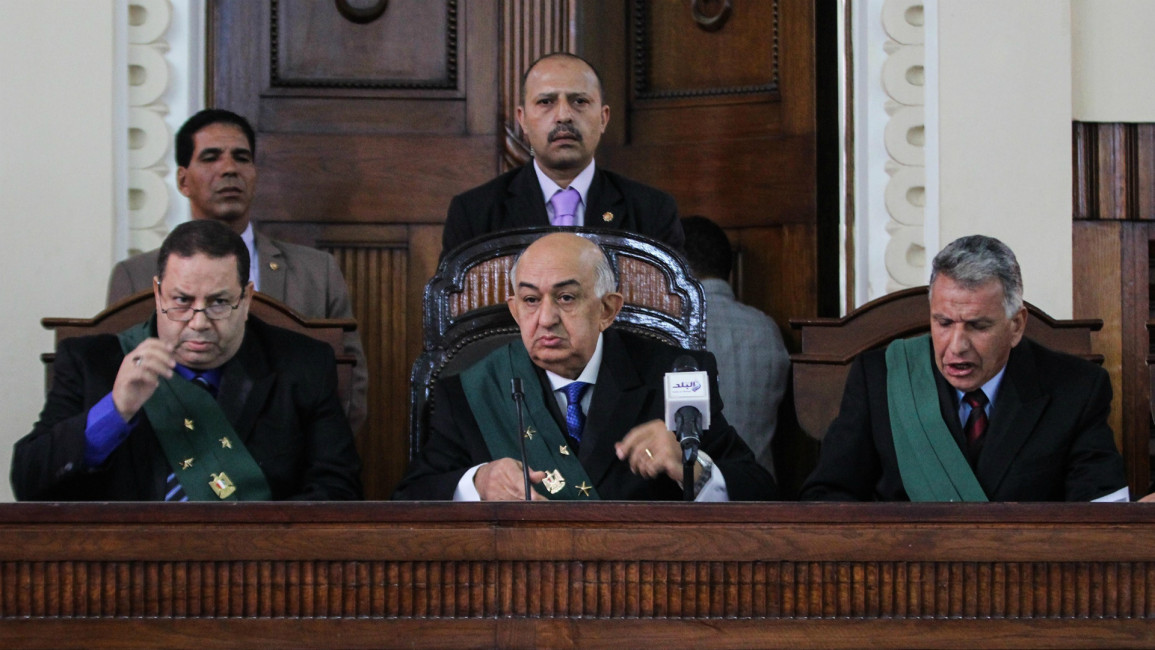Egyptian court: Muslim Brotherhood leaders are not terrorists
Egyptian court: Muslim Brotherhood leaders are not terrorists
Egypt's highest court has declared a decision by the Public Prosecutor to include 18 Muslim Brotherhood leaders on a terrorist list to be "null and void".
2 min read
The court said prosecutors should have followed correct procedures [Anadolu]
The Egyptian Court of Cassation has ruled against a decision by the Public Prosecutor to put the names of 18 Muslim Brotherhood leaders on the terrorist list, citing legal errors.
The court's reasoning was that legal procedures followed by the Public Prosecution in Egypt were flawed, particularly during the time of the late Attorney-General Hisham Barakat.
Barakat put the Brotherhood leaders on the terrorist list, contrary to procedures set by Egypt's Terrorist Entities Law which was ratified by Egyptian President Abdel Fattah al-Sisi in February.
The Terrorist Entities law grants the Public Prosecution the authority to issue both a Terrorist Entities list and a Terrorist list.
A "competent state body" would then have the authority to accept or reject the names suggested and consequently dissolve an entity that is placed on the list, freeze its assets, and temporarily deprive individuals or organisations of their political rights.
The Public Prosecution made a mistake by unilaterally issuing a decision to include Muslim Brotherhood Chairman Mohammad Badie, his first deputy Khairat Al-Shater, his predecessor Mohammad Mahdi Akef, Issam al-Aryan, Mohammad al-Baltagi and 14 others on the Terrorist list without the approval of the relevant authorities.
The court declared the Public Prosecution's decision "null and void", "false" amd as having "no legal effect".
According to the Court of Cassation, the Public Prosecution should have followed correct procedures and sent the list to one of its criminal divisions to review it and make a decision within seven days. Instead, the prosecution sent the list directly to the court and the matter took six months.
The competent criminal authority with the right to accept or reject names on rhw list acts as a judicial body - and the Public Prosecution cannot usurp that right, said court officials.
The court's reasoning was that legal procedures followed by the Public Prosecution in Egypt were flawed, particularly during the time of the late Attorney-General Hisham Barakat.
Barakat put the Brotherhood leaders on the terrorist list, contrary to procedures set by Egypt's Terrorist Entities Law which was ratified by Egyptian President Abdel Fattah al-Sisi in February.
The Terrorist Entities law grants the Public Prosecution the authority to issue both a Terrorist Entities list and a Terrorist list.
A "competent state body" would then have the authority to accept or reject the names suggested and consequently dissolve an entity that is placed on the list, freeze its assets, and temporarily deprive individuals or organisations of their political rights.
The Public Prosecution made a mistake by unilaterally issuing a decision to include Muslim Brotherhood Chairman Mohammad Badie, his first deputy Khairat Al-Shater, his predecessor Mohammad Mahdi Akef, Issam al-Aryan, Mohammad al-Baltagi and 14 others on the Terrorist list without the approval of the relevant authorities.
The court declared the Public Prosecution's decision "null and void", "false" amd as having "no legal effect".
According to the Court of Cassation, the Public Prosecution should have followed correct procedures and sent the list to one of its criminal divisions to review it and make a decision within seven days. Instead, the prosecution sent the list directly to the court and the matter took six months.
The competent criminal authority with the right to accept or reject names on rhw list acts as a judicial body - and the Public Prosecution cannot usurp that right, said court officials.



